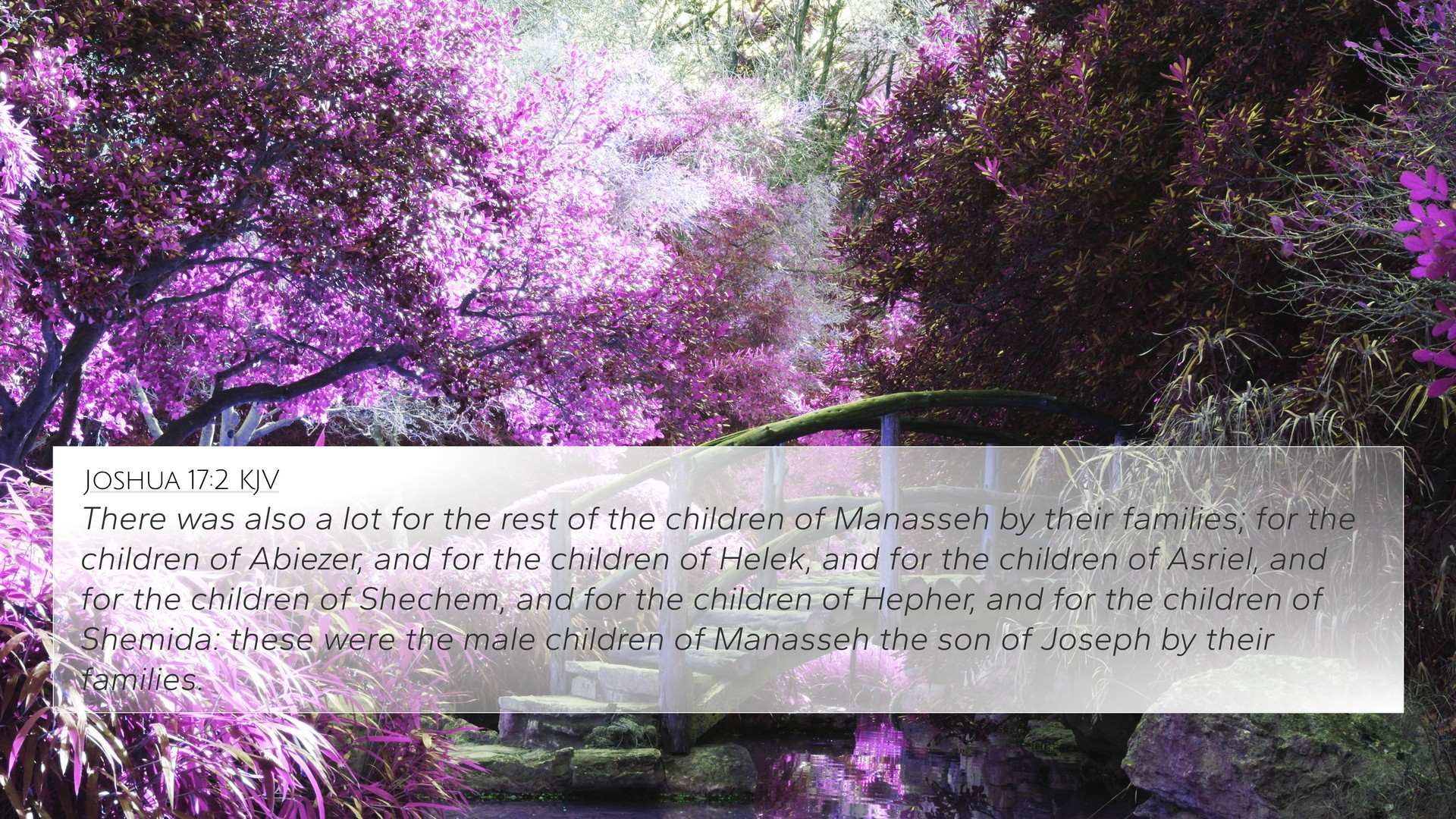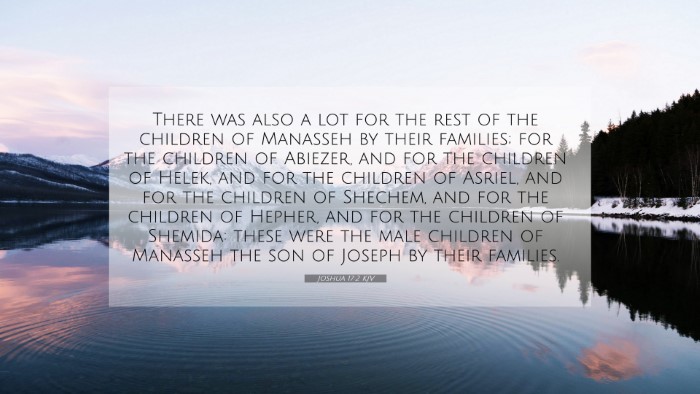Old Testament
Genesis Exodus Leviticus Numbers Deuteronomy Joshua Judges Ruth 1 Samuel 2 Samuel 1 Kings 2 Kings 1 Chronicles 2 Chronicles Ezra Nehemiah Esther Job Psalms Proverbs Ecclesiastes Song of Solomon Isaiah Jeremiah Lamentations Ezekiel Daniel Hosea Joel Amos Obadiah Jonah Micah Nahum Habakkuk Zephaniah Haggai Zechariah MalachiJoshua 17:2 Similar Verses
Joshua 17:2 Cross References
There was also a lot for the rest of the children of Manasseh by their families; for the children of Abiezer, and for the children of Helek, and for the children of Asriel, and for the children of Shechem, and for the children of Hepher, and for the children of Shemida: these were the male children of Manasseh the son of Joseph by their families.
Uncover the Rich Themes and Topics of This Bible Verse
Listed below are the Bible themes associated with Joshua 17:2. We invite you to explore each theme to gain deeper insights into the Scriptures.
Joshua 17:2 Cross Reference Verses
This section features a detailed cross-reference designed to enrich your understanding of the Scriptures. Below, you will find carefully selected verses that echo the themes and teachings related to Joshua 17:2 KJV. Click on any image to explore detailed analyses of related Bible verses and uncover deeper theological insights.
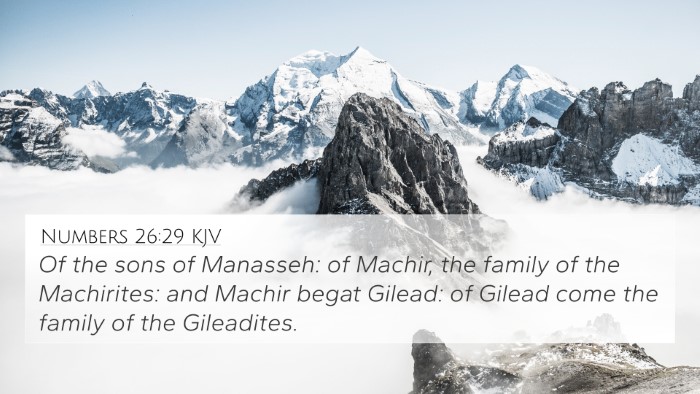
Numbers 26:29 (KJV) »
Of the sons of Manasseh: of Machir, the family of the Machirites: and Machir begat Gilead: of Gilead come the family of the Gileadites.
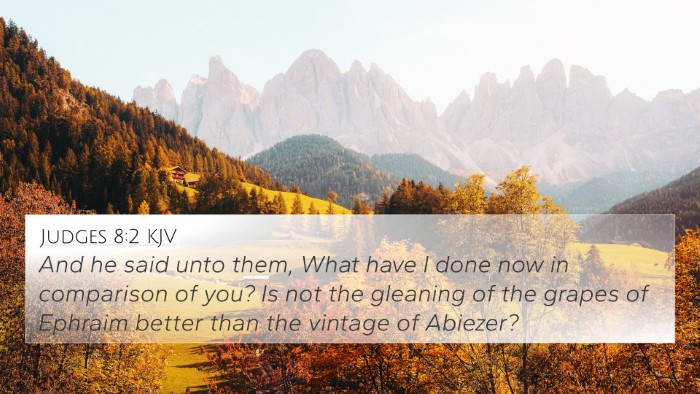
Judges 8:2 (KJV) »
And he said unto them, What have I done now in comparison of you? Is not the gleaning of the grapes of Ephraim better than the vintage of Abiezer?
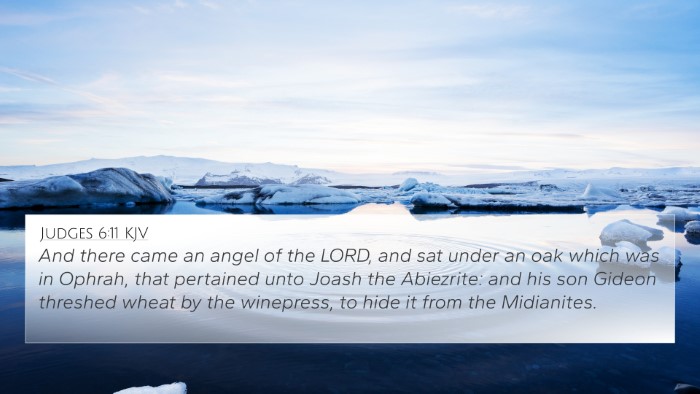
Judges 6:11 (KJV) »
And there came an angel of the LORD, and sat under an oak which was in Ophrah, that pertained unto Joash the Abiezrite: and his son Gideon threshed wheat by the winepress, to hide it from the Midianites.
Joshua 17:2 Verse Analysis and Similar Verses
Understanding Joshua 17:2
Joshua 17:2 reads: "And there was a lot for the rest of the children of Manasseh by their families; for the children of Abiezer, and for the children of Helek, and for the children of Asriel, and for the children of Shechem, and for the children of Hepher, and for the children of Michal. These are the children of Manasseh the son of Joseph, the male children of Manasseh." This verse depicts the division of the land among the tribes of Israel, specifically focusing on the tribe of Manasseh.
Contextual Significance
In this passage, we see the essential process of distributing the Promised Land among the tribes of Israel following their conquest. The act of drawing lots reflects God's sovereignty in guiding His people. As noted by Matthew Henry, the allocation was not merely a matter of chance but divinely ordained, emphasizing that God's purpose and plan govern all affairs.
Interpretations from Commentaries
-
Matthew Henry:
Henry illustrates that this allotment shows the importance of families and lineages in Israel, highlighting God's plan to bless the descendants of Abraham through land inheritance. It showcases the fulfillment of God's promise to the patriarchs.
-
Albert Barnes:
Barnes draws attention to the division based on families, indicating that inheritance among the Israelites was closely tied to their tribal affiliations and ancestral backgrounds. He emphasizes the significance of each family receiving its rightful place as part of God's covenant promise.
-
Adam Clarke:
Clarke provides insights into the historical context, elucidating that the tribes were not merely receiving land but were part of a divine order that reflects God's character and intentions for His people. He notes that the names listed are significant, representing faithful families dedicated to God's service.
Connections to Other Bible Verses
This passage is interwoven with various other texts in the Bible, establishing a rich tapestry of connections, including:
- Numbers 26:29-34: Discusses the lineage of Manasseh and his descendants.
- Deuteronomy 3:13-14: Addresses the territories assigned to the half-tribe of Manasseh.
- Genesis 48:5: The blessing of Joseph’s sons, Ephraim and Manasseh, further solidifying their identities as tribes within Israel.
- Joshua 14:4: Mentions the division of land among the tribes, reinforcing their distinct inheritances.
- 1 Chronicles 5:16: Provides genealogical details about the tribe of Manasseh, linking the historical narrative.
- Zechariah 10:6: Highlights God's intent to restore the houses of Joseph, referring to the tribes under Joseph's lineage.
- Ephesians 1:11: Reveals God's ultimate plan and inheritance in Christ, paralleling the tangible inheritance in Joshua.
- Hebrews 11:9: Although discussing faith, it reflects on the inheritance aspect shared by the patriarchs, including Joseph and his lineage.
- Revelation 7:6: Lists the tribes of Israel, including Manasseh, reinforcing their significance in biblical prophecy.
- Matthew 1:10: Mentions the lineage of Manasseh in the genealogy of Jesus, connecting the Old Testament promise to the New Testament fulfillment.
Thematic Connections
Joshua 17:2 provides a fertile ground for thematic Bible verse connections. These themes include:
- Divine Guidance: The casting of lots implies God's hand in determining the inheritance.
- Covenant Fulfillment: The allotment signifies God's faithfulness to His promises made to the patriarchs.
- Family and Legacy: The detailed lineage showcases how God values family units and their inheritances.
- Community and Belonging: Each family receiving land implies the importance of community among the tribes.
- Faithful Remembrance: The mention of specific families encourages remembering God's work through generations.
Cross-Referencing Biblical Texts
For those engaged in cross-referencing Bible study, Joshua 17:2 serves as a foundation for understanding Israel's historical context, land distribution, and God's faithfulness to His people. Utilizing Bible concordances and cross-reference guides can streamline the study process, guiding one to related texts and deepening comprehension of thematic overlaps.
Conclusion
Joshua 17:2 stands as a testament to God's providence and the significance of familial identities within His divine plan. Through cross-referencing and exploring connections to other scriptures, believers can gain a fuller understanding of their spiritual inheritance and what it means in the broader narrative of God’s covenant with His people.
